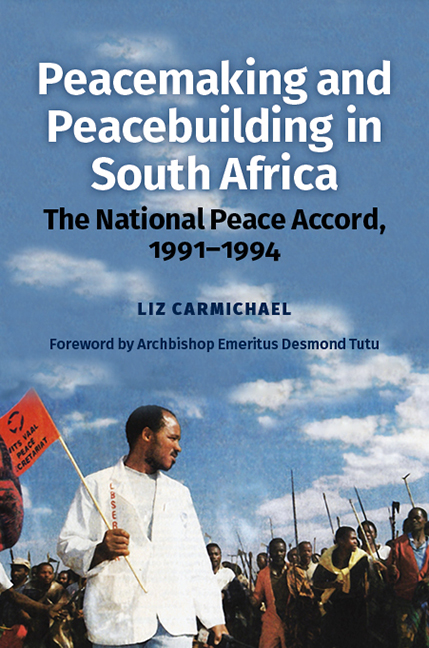Book contents
- Frontmatter
- Dedication
- Contents
- List of Illustrations
- List of Abbreviations
- Glossary
- Acknowledgements
- Note on Nomenclature
- Transition Timeline
- Foreword
- Introduction
- Part One Peacemaking, Peacebuilding, and the South African Conflict
- Part Two Peacemaking
- Part Three Peacebuilding
- Conclusion: Impact and Unfinished Business
- Bibliography
- Index
11 - National Peace Committee: Promoting Peace
Published online by Cambridge University Press: 08 October 2022
- Frontmatter
- Dedication
- Contents
- List of Illustrations
- List of Abbreviations
- Glossary
- Acknowledgements
- Note on Nomenclature
- Transition Timeline
- Foreword
- Introduction
- Part One Peacemaking, Peacebuilding, and the South African Conflict
- Part Two Peacemaking
- Part Three Peacebuilding
- Conclusion: Impact and Unfinished Business
- Bibliography
- Index
Summary
Introduction
The first necessity was to establish the National Peace Committee (NPC), from which the other structures would derive. The NPC was not statutory; its legitimacy rested solely on multiparty consensus through the Accord. By remaining non-statutory it remained approachable by the PAC and other organizations that refused any formal relationship with the government. By nominating the persons to be appointed to the NPS, Commission and Police Board, it conferred its own consensual legitimacy on them. The reports submitted to the State President by the NPS and Commission went also to the NPC.
The NPC was to ‘monitor and to make recommendation on the implementation of the NPA as a whole, and to ensure compliance with the Code of Conduct for Political Parties and organizations’ (8.2). It had powers to ‘promote the aims and spirit of the National Peace Accord’ (8.4.1.1); to convene the signatories ‘where necessary’ and to ‘negotiate and conclude further agreements to achieve the objects of the National Peace Accord’ (8.4.1.4).
The NPC provided the space, outside the constitutional talks, for parties at national level to complain about each other. Although it was not called the ‘National Dispute Resolution Committee’, it had the function of resolving disputes concerning transgressions or interpretation of the political Code. It could refer complaints to a sub-committee or arbitrator (9.2–6) but had no coercive powers beyond publicly shaming the offenders. It developed amendments to the Accord, mainly concerned with the complaints procedure, which however were not incorporated due to the difficulty of reconvening the signatories to agree them.
The NPC established and oversaw national sub-committees for Publicity, SERD, and Complaints. It was most active during its first year, when the Full NPC met frequently. Then Publicity, and finally SERD, moved to the NPS and, as Rupert Lorimer who served on both bodies remarks, in terms of activity the NPS ‘really supplanted the NPC’. In terms of maintaining contact while the constitutional talks were in abeyance from May 1992 to April 1993, the monthly NPC Executive meetings continued to bring the three main parties together and there were no walk-outs.
- Type
- Chapter
- Information
- Peacemaking and Peacebuilding in South AfricaThe National Peace Accord, 1991-1994, pp. 201 - 235Publisher: Boydell & BrewerPrint publication year: 2022



